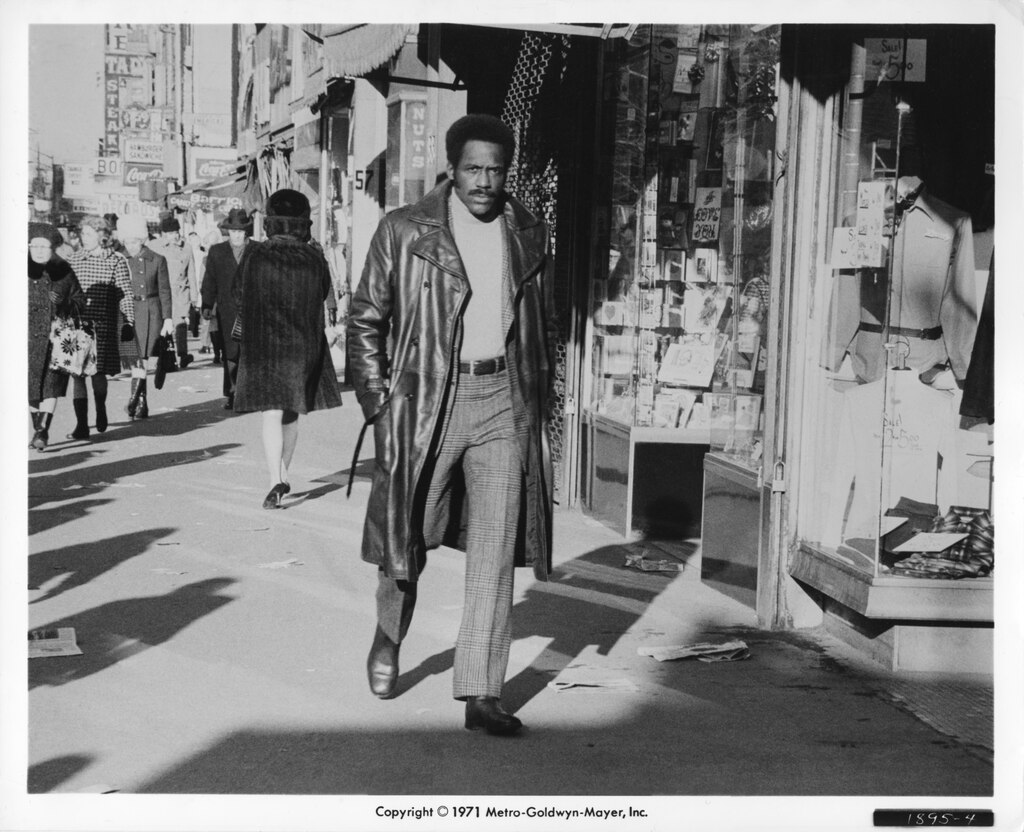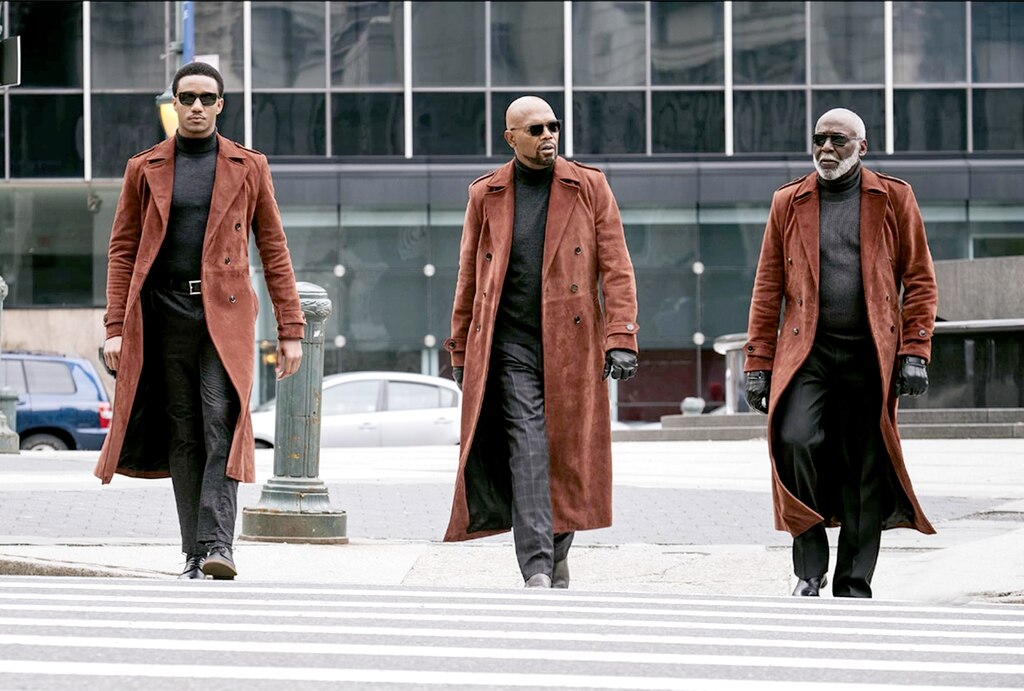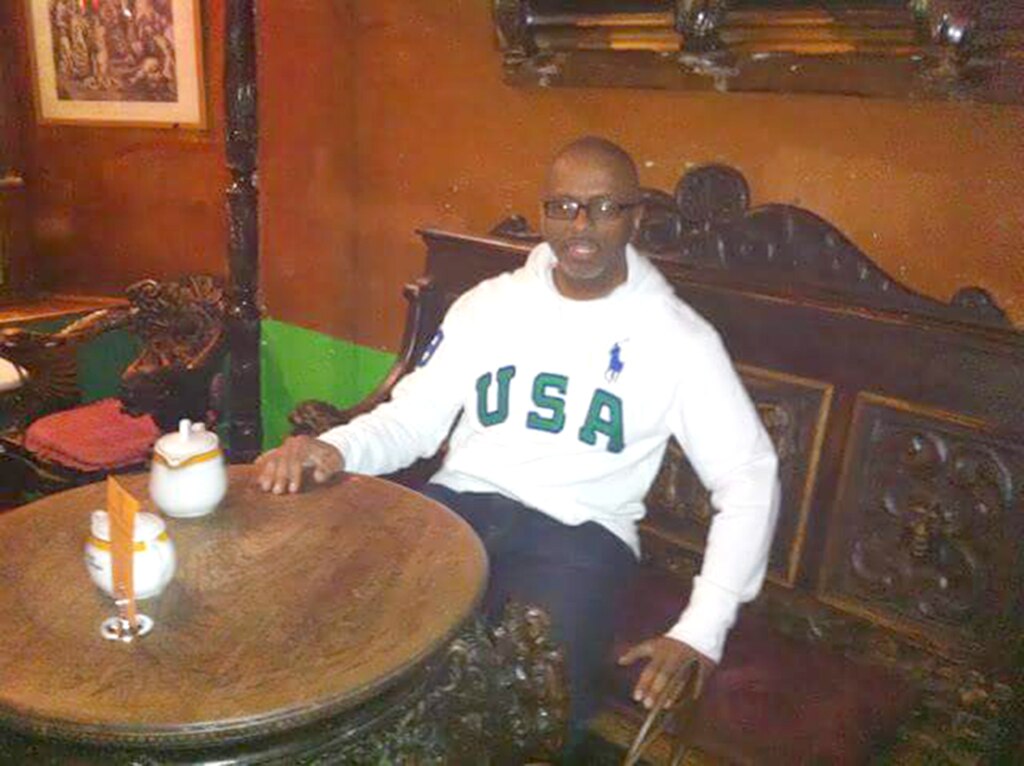When the movie “Shaft” opened in Baltimore, and then in other parts of the country in the days that followed, Richard Roundtree brought movie audiences a kind of portrayal they’d never seen on screen, particularly in a U.S. feature film.
This was a Black man walking through the world on his own terms. We learned a lot about him just while watching the opening credits, as he walked through the crowded and traffic-filled New York City streets in that iconic full-length, double-breasted leather trenchcoat. He walked looking only straight ahead as he crossed the streets against traffic. He looked toward a taxi once, only to respond to a honking horn with an obscene remark and gesture.
We sense right away that anyone who would disrespect or cross him would do so at great risk.
As the Academy Award-winning theme plays, Isaac Hayes’ vocals and the “Shaft” lyrics confirm that impression. It is further verified a short time later after John Shaft reaches his Greenwich Village office.
Two gangsters jump him there, and one of them ends up meeting his demise after going through the office window and landing on the sidewalk below.
Throughout the movie, Roundtree’s portrayal presents a Black man asserting himself physically, verbally and sexually in a way that hadn’t happened in American feature films before. He didn’t defer to anyone, white or Black. He single-handedly countered decades of movie portrayals of Black men as cowardly and clownish.
His portrayal also departed from the presentation of Black male heroism that Sidney Poitier brought to movie audiences. The power of Poitier’s characters almost always derived from their dignity and morality. Each character was almost always this kind of idealized portrayal of a Black man, and Poitier’s enormous talent allowed those characters to have the broadest appeal to white and Black audiences.
In the years following the Civil Rights protests of the 1950s and 1960s, Black audiences were certainly hungry to see a Black lead actor in characterizations more akin to what John Wayne or Sean Connery brought to the screen. Because we knew that in reality, there were Black men in all walks of life who didn’t put up with any disrespect, who lived by his own rules and standards, and who would take a swing or a shot at anyone who crossed them.

The John Shaft role was Roundtree’s first in a feature film. He was discovered while modeling for Black hair care brands and other products in Ebony and Jet magazines. He also modeled in the Ebony Fashion Fair shows.
With the John Shaft character, Roundtree was every bit as responsible for inventing the modern movie action hero as any white actor. But he pulled this off in the context of representing all other Black men and exhibiting political consciousness. John Shaft is a private investigator who can stand up to the New York Police Department, the Mafia and Black gangsters — all at the same time.
Black actors, in particular, credit Richard Roundtree with paving the way for opportunities to star or appear in today’s action movies.
Samuel L. Jackson and Gabrielle Union were among those who paid tribute to Roundtree after he died Tuesday after a short battle with pancreatic cancer. He was 81.
Jackson portrayed John Shaft’s nephew in the 2000 sequel to the original “Shaft.” He posted a photo of himself and Roundtree on Instagram from the 2019 action thriller, also titled “Shaft.”

“Richard Roundtree, The Prototype, The Best To Ever Do It!!! SHAFT, as we know it is & will always be His Creation!!” Jackson wrote in the caption. “His passing leaves a deep hole not only in my heart, but I’m sure a lotta y’all’s, too.”
“Love you Brother, I see you walking down the Middle of Main Street in Heaven & Issac’s Conducting your song coat blowin’ in wind!! Angels whispering, ‘That Cat SHAFT Is A Bad Mutha, Shutcho Mouth!! But I’m Talkin’ Bout SHAFT!! THEN WE CAN DIGIT,’” he continued, referring to the “Shaft” theme song.
Union, who starred alongside Roundtree in the drama series “Being Mary Jane,” said working with him “was a dream.”
Getting to hang out with him & our ‘Being Mary Jane’ family was always a good ass time with the best stories and laughs,” Union wrote on X/Twitter.

Gordon Parks took on the role of directing “Shaft” and guiding a project that would represent a milestone for Black America and for the motion picture industry. Parks was the most logical choice because his photographs, previous film work, and other projects gave the world a look into the lives of Black Americans in a way that no other artist ever had.
In a 1972 interview with film critic Roger Ebert, Parks talked about the impact of “Shaft” and his reaction after seeing audiences lined up around the block outside New York City theaters.
“Ghetto kids were coming downtown to see their hero, Shaft, and here was a Black man on the screen they didn’t have to be ashamed of. Here they had a chance to spend their $3 on something they wanted to see. We need movies about the history of our people, yes, but we need heroic fantasies about our people, too. We all need a little James Bond now and then.”
The film premiered on the East Coast in Baltimore, at the Hippodrome Theatre, on Thursday, June 24, 1971. That was one day after its world premiere in Detroit at the Palms Theatre. Clearly, the openings targeted cities with receptive Black audiences and with cultural heritages steeped in Black entertainment.
“Shaft” opened in Chicago on June 30 at the Roosevelt Theater and ran showings from 8:45 a.m. through midnight, according to the Guide to the World of Shaft, by writer and film critic Steve Aldous. The film reportedly grossed $108,000 in its first week at that theater, an almost-unheard-of box office performance considering the cost of movie tickets at the time.
“Shaft” led the way in the release of films through the 1970s that would become known as Blaxploitation movies. It was soon followed by “Cotton Comes to Harlem,” “Superfly,” “The Mack,” “Coffy,” “Foxy Brown,” “Trouble Man” and dozens more. Roundtree would go on to star in the sequels “Shaft’s Big Score” and “Shaft in Africa.” He also reprised the role in a short-lived TV series.
I can recall an interview Roundtree did with television host David Frost in which Frost asked for his thoughts about that genre of films. Roundtree said he rejected use of the term “Blaxploitation” because all kinds of movies, not just ones with Black stars, could be characterized as exploitative in how they attract audiences.

Whenever I’m in New York and make it over to Greenwich Village, I find a reason to visit Caffe Reggio at 119 MacDougal Street. That location is featured several times in “Shaft,” and it is the scene of a pivotal meeting where John Shaft meets with a Black crime boss and a Mafia boss.
The actual furniture from that scene was still there the last time I visited. I get a particular charge out of sitting in that same chair where Richard Roundtree sat as John Shaft, setting things right from Harlem to The Village while enjoying a cappuccino.
Mark Williams is The Baltimore Banner’s Opinion Editor.
mark.williams@thebaltimorebanner.com
The Baltimore Banner welcomes opinion pieces and letters to the editor. Please send submissions to communityvoices@thebaltimorebanner.com or letters@thebaltimorebanner.com.




Comments
Welcome to The Banner's subscriber-only commenting community. Please review our community guidelines.